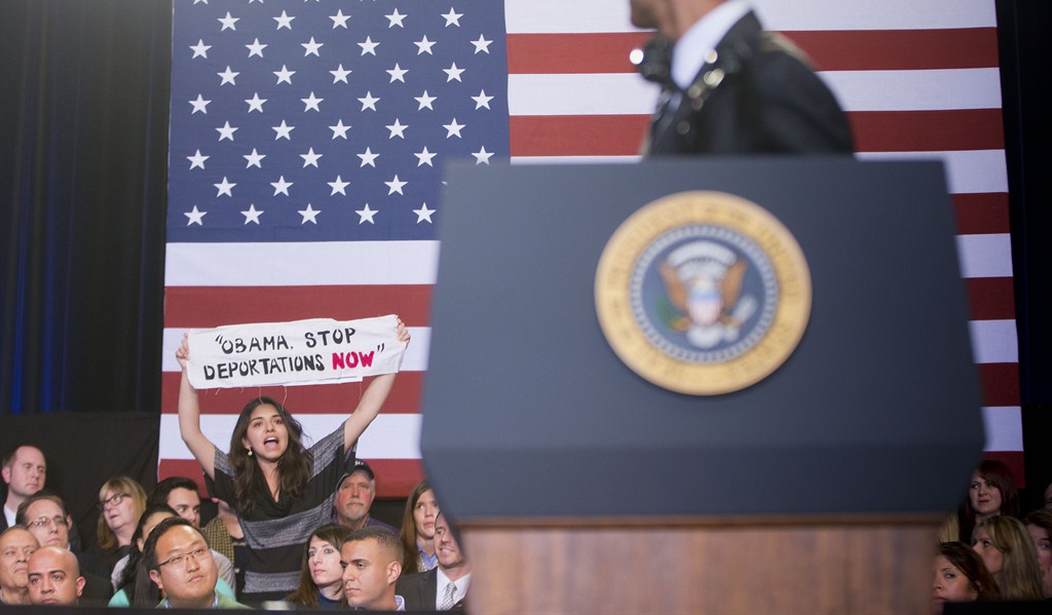President Barack Obama tried to put a positive spin on his decision to issue an executive order to give several million illegal aliens clemency but his move also may have an unintended consequence of creating heightened job competition for America’s unemployed.
Despite President Obama’s historic role as the country’s first African head of state, his new policy actually may hurt unemployed African Americans as much as any segment of the U.S. population. The addition of nearly 5 million people into the mainstream workforce to seek employment will increase competition for jobs and put downward pressure on wages, at least in the short term.
The African American unemployment rate is more than double the percentage for white and Asian Americans. In October 2014, unemployment for African Americans hit 10.7% while it settled at 4.6% for white Americans, 5% for Asian Americans and 6.5% for Hispanic Americans, according to the latest numbers available from the U.S. Bureau of Labor Statistics.
African Americans between the ages of 16 and 19 registered a disproportionately high unemployment rate during October 2014 of 30.6%, compared to 16.1% for white Americans in the same age range. Minorities too often are lulled into a false sense that the government will provide for them when aid actually is best used as a short-term safety net for people who need help as they seek a new job.
Not only will minorities and young people who have the highest rates of unemployment face heightened competition for jobs, the president’s amnesty program for illegal aliens would boost the cost of government services for U.S. taxpayers. Substantial job growth will be needed to provide employment opportunities in America, with the U.S. population projected to increase by about 10 million people, or 3 percent, by 2023, and by 16 million, or 4 percent, by 2033.
Recommended
Preliminary U.S. government estimates show that roughly 4.9 million individuals may be eligible for the president’s proposed immigration initiatives. The total number is nearly triple the 1.7 million undocumented immigrants who became lawful permanent residents through the Reagan-era 1986 Immigration Reform and Control Act.
President Obama effectively chose to take action seems destined to hurt minorities and young workers more than other groups of job seekers. His policies have failed to create a strong environment for private sector job growth and there has been no appreciable drop in the poverty rate in the United States under his time in the White House.
Roughly 45.3 million people lived in poverty in America in 2013, according to the U.S. Census Bureau. It marked the third consecutive year that the number of people living in poverty nationally was not statistically different than the previous year’s estimate.
In addition, poverty rates for African Americans and Hispanics greatly exceed the national average, according to the University of Michigan’s National Poverty Center. For 2013, the official U.S poverty rate nationally dipped slightly to 14.5 percent, down from 15 percent in 2012, to mark the first decline in the poverty rate since 2006. Both percentages still are higher than the 14.3 percent of Americans below the poverty line in January 2009.
American voters appeared to show their displeasure with the president’s policies in the 2014 mid-term elections when Republicans won enough seats to gain control of the Senate once the new Congress convenes in January. Rather than try to work with the Republicans who also hold a majority in the U.S. House, President Obama opted to initiate an executive order that raises constitutional questions about possibly overreaching his authority by attempting to address the problem of illegal immigration unilaterally.
Negotiations with Congressional Republicans may be contentious at times but good political leaders persevere to reach workable solutions. If President Obama cannot avoid the temptation to use executive orders to subvert the will of Congress, his last two years in the White House may display a chronic inability to work effectively with others and leave a lasting legacy of discord in his wake.
Paul Dykewicz is the editorial director of Eagle Financial Publications, a columnist for Townhall and Townhall Finance, and the author of a new book, “Holy Smokes! Golden Guidance from Notre Dame’s Championship Chaplain.”

























Join the conversation as a VIP Member